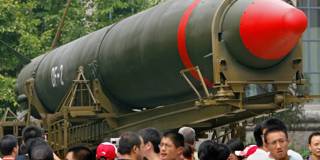Notwithstanding justified concerns about aspiring nuclear powers such as Iran, it is worth remembering that there still are only nine countries with nuclear weapons, far less than the two dozen that John F. Kennedy predicted there would be by the 1970s. When nuclear non-proliferation is prioritized, it works.
CAMBRIDGE – Preparations are already underway at the United Nations for the 2026 Review Conference of the Parties to the Treaty on the Non-Proliferation of Nuclear Weapons (NPT), which was originally signed in 1968. Many expect a contentious event. Some countries are having second thoughts about the principle of non-proliferation, because they wonder if Russia would have invaded Ukraine in 2022 if the latter had kept the nuclear weapons it inherited from the Soviet Union. Such counterfactuals, in turn, have renewed others’ fears of nuclear proliferation.
These concerns are not new, of course. In my memoir, A Life in the American Century, I revisit an equally contentious period in the 1970s, when I was in charge of US President Jimmy Carter’s non-proliferation policy. Following the 1973 oil crisis, the conventional wisdom was that the world was running out of oil and needed to turn to nuclear energy. However, it was also widely – and wrongly – believed that the world was running out of uranium and therefore would have to rely instead on reprocessed plutonium (a byproduct of the uranium used in nuclear reactors).
According to some forecasts at the time, as many as 46 countries would be reprocessing plutonium by 1990. The problem, of course, was that plutonium is a weapons-usable material. A world awash in the trade of plutonium would be at much greater risk of nuclear proliferation and nuclear terrorism.

CAMBRIDGE – Preparations are already underway at the United Nations for the 2026 Review Conference of the Parties to the Treaty on the Non-Proliferation of Nuclear Weapons (NPT), which was originally signed in 1968. Many expect a contentious event. Some countries are having second thoughts about the principle of non-proliferation, because they wonder if Russia would have invaded Ukraine in 2022 if the latter had kept the nuclear weapons it inherited from the Soviet Union. Such counterfactuals, in turn, have renewed others’ fears of nuclear proliferation.
These concerns are not new, of course. In my memoir, A Life in the American Century, I revisit an equally contentious period in the 1970s, when I was in charge of US President Jimmy Carter’s non-proliferation policy. Following the 1973 oil crisis, the conventional wisdom was that the world was running out of oil and needed to turn to nuclear energy. However, it was also widely – and wrongly – believed that the world was running out of uranium and therefore would have to rely instead on reprocessed plutonium (a byproduct of the uranium used in nuclear reactors).
According to some forecasts at the time, as many as 46 countries would be reprocessing plutonium by 1990. The problem, of course, was that plutonium is a weapons-usable material. A world awash in the trade of plutonium would be at much greater risk of nuclear proliferation and nuclear terrorism.